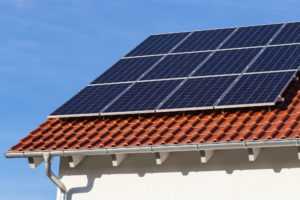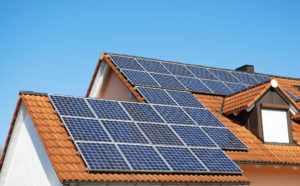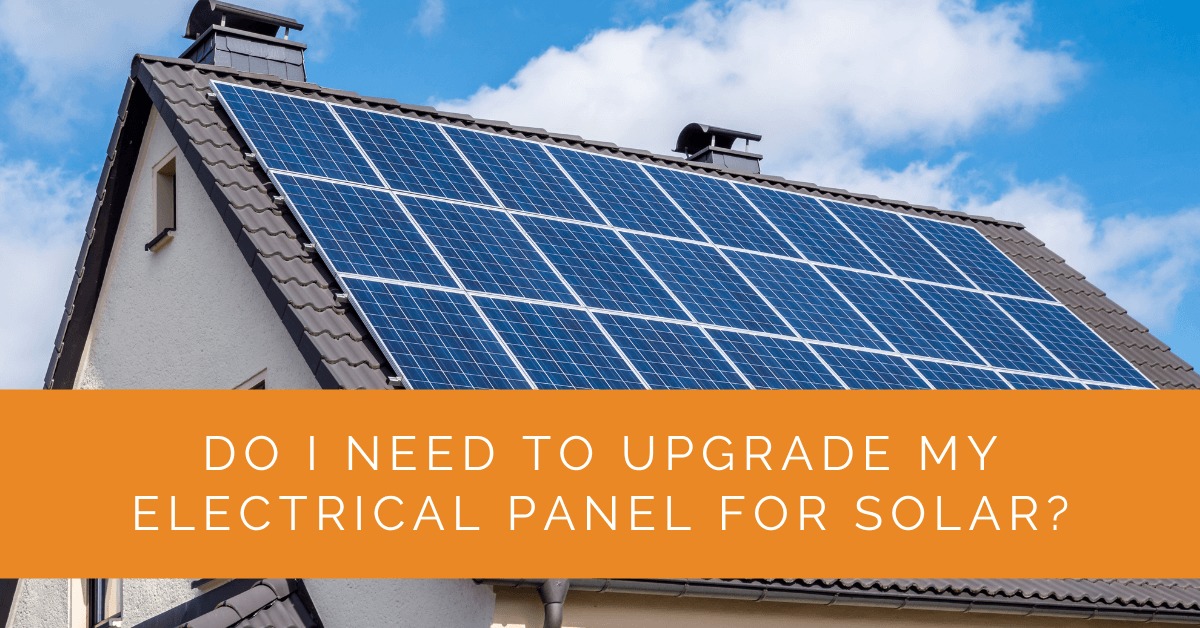Solar energy has gained immense popularity as an eco-friendly, cost-effective way to power homes. But before you embark on your solar journey, one crucial question arises: Do you need to upgrade your solar panel for solar? This guide will delve into the details to help you make an informed decision.
Contents
- 1 Key Takeaways
- 2 Assessing Your Current Electrical Panel
- 3 Benefits of Upgrading Your Electrical Panel
- 4 Electrical Panel Upgrade Checker
- 5 The Process of Upgrading Your Electrical Panel
- 6 DIY vs. Professional Panel Upgrades
- 7 Planning for the Future: New Electrical Panels
- 8 Case Study: Upgrading Electrical Panels for Solar Energy Systems
- 9 Expert Insights From Our Solar Panel Installers About Upgrading Electrical Panels for Solar Panels
- 10 Experience Solar Excellence with Us!
- 11 Conclusion
Key Takeaways
- Assess your current electrical panel for signs of age, capacity issues, and compatibility with a solar energy system.
- Upgrading your panel ensures a smooth solar installation, efficient energy handling, and enhanced safety and reliability.
- Consider professional help for panel upgrades, prioritize safety, and explore modern panel features for future-proofing your home and maximizing sustainability.
Assessing Your Current Electrical Panel
Your main electrical panel, often called the breaker box, is pivotal in distributing electricity throughout your home. Here’s how to determine if it needs an upgrade:
Signs of an Outdated Panel
- Frequent Tripping: If your circuit breakers trip frequently, it could indicate that your panel is struggling to handle your electrical load. Frequent tripping not only disrupts your daily life but also poses safety risks.
- Old Age: Electrical panels typically range from 25-40 years. If your panel is older, it may need an upgrade to meet modern energy demands. Older panels may contain outdated components that could compromise safety.
- Limited Space: An overcrowded panel with no slots for new breakers can hinder the addition of solar components. This lack of space could limit your solar energy system’s capacity and efficiency.
Capacity and Compatibility
- Assessing Load: Calculating your home’s electrical load is a crucial step in determining the necessity of an upgrade. Solar panels add to this load, and an insufficient panel can lead to frequent power outages or tripped breakers.
- Compatibility: Consult a solar expert to determine if your solar panel can safely accommodate a solar energy system. They will evaluate your panel’s capacity and advise on necessary upgrades.
Knowing When to Consider an Upgrade
If your electrical panel is exhibiting signs of age, struggles to meet electrical load demands, or isn’t compatible with solar, it’s time to consider an upgrade. Upgrading your panel ensures a seamless transition to solar power, providing peace of mind and long-term savings.

Benefits of Upgrading Your Electrical Panel
Ensuring a Smooth Solar Installation
When you decide to go solar, a compatible electrical panel is essential. An outdated or inadequate panel can lead to complications during the solar panel system installation, resulting in increased costs and delays. Upgrading your panel beforehand will streamline the installation process, minimizing potential setbacks.
Handling Increased Energy Demand
Solar panels generate electricity, which must be integrated with your existing electrical system. Upgrading your panel allows for the efficient handling surplus energy generated by your solar system. This ensures that you can fully harness the benefits of solar power without overloading your electrical panel.
Enhancing Safety and Reliability
Older panels may have safety issues, such as worn-out components and outdated technology. An electrical panel upgrade ensures your home’s electrical system is up-to-date and safe for your family. Investing in safety protects your property and minimizes the risk of electrical accidents.
Electrical Panel Upgrade Checker
Find out if your panel is ready for solar — or if it’s time to consider an upgrade:
The Process of Upgrading Your Electrical Panel
Finding a Qualified Electrician
Seeking out a licensed and experienced electrician is paramount when considering an electrical panel upgrade. These professionals can assess your current panel, recommend necessary upgrades, and ensure compliance with local regulations. Hiring a qualified electrician reduces the likelihood of errors during the upgrade process.
Permits and Regulations
Before proceeding with an upgrade, obtaining the necessary permits is essential. Compliance with local building codes and regulations is crucial to ensure safety and legality. Electricians well-versed in local codes can help you navigate this process smoothly.
Cost Considerations
The cost of upgrading your electrical panel can vary based on several factors, including the panel size, labor costs, and local rates. However, consider it an investment that will pay off in terms of safety, reliability, and the ease of going solar. While the upfront costs may seem substantial, they are offset by the long-term benefits of a more efficient and reliable electrical system.

DIY vs. Professional Panel Upgrades
Pros and Cons of DIY Upgrades
While some homeowners may consider a DIY approach to panel upgrades, carefully weigh the pros and cons.
Pros
- Potential cost savings on labor.
- A sense of accomplishment.
Cons
- Safety risks associated with working on electrical systems.
- Lack of expertise in assessing panel needs and ensuring compliance with regulations.
- The potential for costly mistakes that could lead to future issues.
When to Seek Professional Help
If you’re not well-versed in electrical work, or if your panel upgrade is associated with a solar installation, it’s best to hire a professional electrician. They’ll ensure the work is done correctly and safely, reducing the likelihood of safety hazards, code violations, or future problems.
Safety Precautions for DIY Projects
If you’re determined to take on a DIY panel upgrade, prioritize safety. Turn off the main breaker, use appropriate safety gear, and follow safety guidelines rigorously. Remember that even with precautions, the risks associated with DIY electrical work can be significant.
Planning for the Future: New Electrical Panels
Modern Electrical Panel Features
New electrical panels offer advanced features that enhance your home’s electrical system and prepare it for the future. These features include:
- Surge Protection: Protects your home from voltage spikes that could damage electronics.
- Smart Monitoring lets you track energy usage and identify potential issues remotely.
- Increased Breaker Capacity: Provides room for additional circuits, accommodating future electrical needs such as electric vehicle charging stations.
Future-Proofing Your Home
Investing in a modern electrical panel can future-proof your home. It ensures your electrical system can adapt to evolving technologies, including electric vehicle charging stations and other energy-efficient upgrades. By anticipating future needs, you save on potential retrofitting costs.
Maximizing Efficiency and Sustainability
A modern electrical panel can help you make the most of your solar energy system. It allows for efficient solar power distribution throughout your home, reducing your reliance on grid electricity. As electric vehicles become more prevalent, your upgraded panel can also support convenient at-home charging, reducing your carbon footprint.
Case Study: Upgrading Electrical Panels for Solar Energy Systems
Background
At Solar Panels Network USA, we understand that a successful transition to solar energy requires a thorough assessment of existing electrical infrastructure. This case study illustrates how upgrading an outdated electrical panel facilitated a seamless solar panel installation for a homeowner.
Project Overview
The homeowner, an enthusiastic advocate for renewable energy, approached us to install a solar panel system on their property. During the initial consultation, we identified that their existing electrical panel was outdated and insufficient to support the new solar energy system. Recognizing the critical role of a compatible electrical panel, we recommended an upgrade to ensure a safe and efficient solar installation.
Assessing the Existing Electrical Panel
Initial Evaluation
Our team conducted a comprehensive evaluation of the homeowner’s current electrical panel. The panel showed signs of aging, frequent tripping of breakers, and limited capacity for additional circuits. These factors indicated the necessity for an upgrade to accommodate the solar system’s requirements.
Compatibility Concerns
The existing panel was not equipped to handle the bidirectional flow of electricity generated by the solar panels. Without an upgrade, the homeowner would face challenges in efficiently integrating solar energy into their home’s electrical system, potentially compromising both performance and safety.
The Role of the Electrical Panel Upgrade
Ensuring Capacity and Safety
We proposed upgrading to a modern electrical panel with sufficient capacity to handle the increased electrical load from the solar panels. This upgrade would prevent overloading, reduce the risk of electrical hazards, and ensure compliance with current electrical codes.
Enhancing Efficiency and Reliability
The new panel featured advanced safety mechanisms, surge protection, and additional breaker slots, providing room for future electrical needs such as electric vehicle charging stations. These enhancements not only improved the system’s efficiency but also future-proofed the homeowner’s electrical infrastructure.
Implementation
Coordination with a Qualified Electrician
We partnered with a licensed and experienced electrician to carry out the panel upgrade. The electrician conducted a detailed assessment, obtained necessary permits, and ensured all work complied with local regulations. This professional approach minimized risks and guaranteed a high-quality installation.
Seamless Transition
The upgrade process involved removing the old panel, installing the new one, and configuring it to work with the solar energy system. Our team coordinated closely with the electrician to ensure a seamless transition, with minimal disruption to the homeowner’s daily activities.
Results
Improved Performance and Safety
With the new electrical panel in place, the homeowner experienced immediate improvements in system performance and safety. The panel efficiently managed the electricity generated by the solar panels, preventing overloads and ensuring reliable energy distribution throughout the home.
Optimized Solar Energy Utilization
The upgraded panel allowed the homeowner to maximize the benefits of their solar energy system. Accurate tracking of energy production and consumption enabled them to optimize their energy usage, resulting in significant savings on their electricity bills.
Future-Proofing
The modern panel’s additional features and capacity provided the homeowner with the flexibility to incorporate future energy-efficient upgrades, such as electric vehicle charging stations. This foresight ensured that their electrical system would remain robust and adaptable to evolving technologies.
Summary
This case study demonstrates the importance of upgrading an electrical panel when installing a solar energy system. By addressing capacity and safety concerns, the upgrade facilitated a smooth and efficient solar installation, optimizing energy utilization and future-proofing the homeowner’s electrical infrastructure. At Solar Panels Network USA, we are committed to providing comprehensive solutions that enhance the performance and reliability of our clients’ solar energy systems.
Upgrading your electrical panel is a vital step in ensuring the success of your solar installation. It enhances safety, efficiency, and long-term savings, enabling you to fully harness the benefits of solar power. If you’re considering going solar, consult with our experts to assess your electrical panel and explore the best options for a seamless transition to renewable energy.
Expert Insights From Our Solar Panel Installers About Upgrading Electrical Panels for Solar Panels
Upgrading your electrical panel is crucial for a smooth solar installation. It ensures your system can handle the increased load and helps prevent potential safety hazards.
Senior Solar Engineer
Many older electrical panels lack the capacity to support solar energy systems. Upgrading to a modern panel not only enhances safety but also optimizes the efficiency of your solar investment.
Lead Electrician
Consulting with a qualified electrician before installing solar panels is essential. They can assess your current panel’s condition and recommend necessary upgrades to ensure compliance and reliability.
Solar Installation Specialist
Experience Solar Excellence with Us!
Trust in Solar Panels Network USA, where our seasoned experts deliver top-quality solar solutions for homes and businesses nationwide. With a legacy of countless successful installations and a commitment to sustainable energy, we’re your reliable partner in the solar journey. Ready for a brighter, eco-friendly future? Call us now at (855) 427-0058 and harness the power of the sun!
Conclusion
Upgrading your electrical panel when considering solar energy is critical to a successful and hassle-free transition. It ensures safety, compatibility, and efficiency in harnessing the benefits of solar power. Don’t hesitate to consult a qualified electrician to determine the best action for your specific needs.
By making the right decisions now, you can enjoy the rewards of a robust electrical panel, a sustainable solar energy system, and even potential tax credits for your commitment to clean energy. Prioritize safety, efficiency, and long-term savings as you embark on your solar-powered journey.
About the Author
Solar Panels Network USA stands at the forefront of solar energy solutions, driven by a team of seasoned solar engineers and energy consultants. With over decades of experience in delivering high-quality solar installations and maintenance, we are committed to promoting sustainable energy through customer-centric, tailored solutions. Our articles reflect this commitment, crafted collaboratively by experts to provide accurate, up-to-date insights into solar technology, ensuring our readers are well-informed and empowered in their solar energy decisions.

